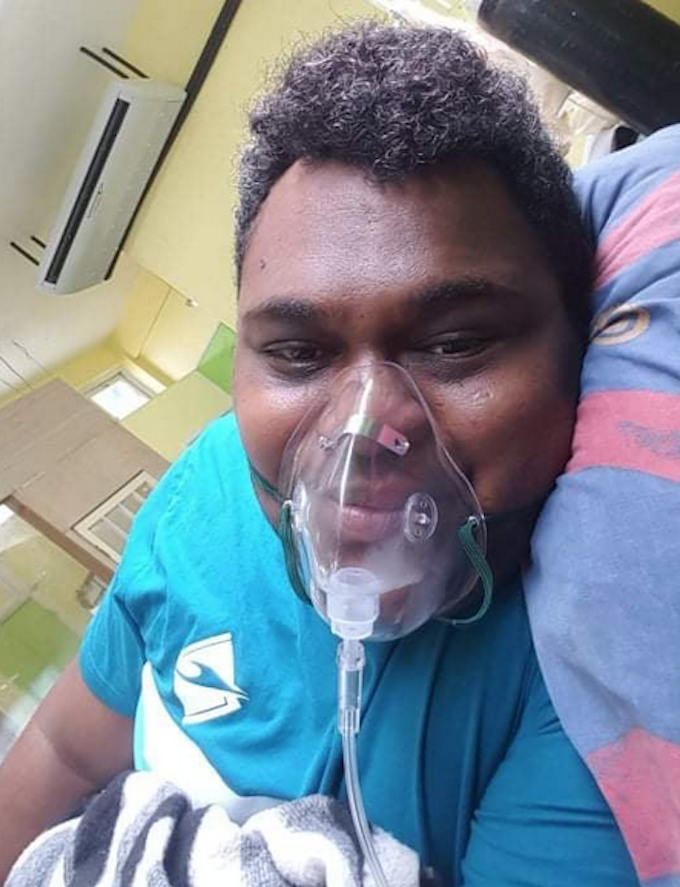
By Josefa Babitu in Suva
If it was not for his friend who broke into his home after he was gasping for air, Antonio Ratuvili would be among dozens of Fijians who have died from covid-19 this year.
Ratuvili was “grey-faced spectra, gasping for every breath, and in a thoroughly confused state” on his deathbed when his friend found him.
Within an hour he found himself in the “red zone” part of the Colonial War Memorial (CWM) Hospital in Fiji’s capital Suva.
- READ MORE: Fiji reports record 1220 cases in one day – covid death toll now 70
- Other Fiji covid pandemic articles
“As soon as I arrived, the staff gathered around me and, as they poked and prodded and adjusted my oxygen supply, they looked like curious, oversized insects in their masks and visors: bees, say, or ants,” he told Asia Pacific Report.
“There was no exit, or at least anything that could be seen from where I was lying, no longer a larval mass — just an overweight, utterly extenuated human male.
“Of course, I couldn’t see the entire room because, like Gulliver in Lilliput, I was pinned down by an elaborate system of tubes and wiring.”
The battle depends solely on his immune system because he has not received his AstraZeneca vaccine that everybody in Fiji is entitled to.
‘Drips and bleeping instruments’
“The ants (healthcare workers) might have abandoned me, but they had tethered my body to a variety of monitors and drips and bleeping instruments, and I was still being fed oxygen through a large, clear face mask – which suggested that, at some point, somebody would turn up, to do whatever remained to be done,” he said.
“This all seemed to be happening in a makeshift theatre of managed chaos, like a scene from Casualty or an alien abduction movie. Then, just as suddenly, it was quiet.
“I was alone and the sealed room was quiet. It was a veritable study in solipsism: I existed, I was sentient, but nothing else was certain.”
The 25-year-old faith-based NGO worker battled covid-19 for 17 days together with 10,033 other patients in dedicated facilities around the nation.
He was discharged from CWM hospital on Wednesday.
“Today, I am still breathing, and with the right medication and support, I may continue to do so for some time. But I remember all too vividly the sensation of not being able to breathe. That sensation is as close as I have ever come to existential panic.
“I survived by the grace of God.
Greatest teaching
He added the lesson learnt would be the greatest teaching he has ever had.
Ratuvili said he got the virus because of his ignorance of the symptoms of the virus. He was under the assumption that he was having a somewhat “normal flu”.
“This was my original mistake. Though it made sense from one angle, it was still an assumption, a self-fulfilling diagnosis based on a mix of anecdote and magical thinking.
“Still, it seemed reasonable enough, at the time. I was fighting for breath, any physical activity was an effort, I had been suffering for weeks from a dry, nagging cough and, though these could have been symptoms of anything — from a common cold, to bronchitis, to the unforeseen combination of ‘co-morbidities’ that, over the next several days, almost killed me — I had resolved upon coronavirus.
“Self-diagnosis, followed by self-medication. As with so many men my age, this seemed infinitely preferable to seeing a doctor.”
Fiji fights delta variant
Like New South Wales and Vioctoria in Australia, Fiji is fighting the delta variant of the virus that has caused the current outbreak since April 19 this year with 12,596 people having contracted the virus and 69 deaths in just less than four months.
So far, only 2535 people have recovered.
In a statement on Wednesday, Health Secretary Dr James Fong revealed that national seven-day average daily test positivity was 18 percent and was continuing on an upward trend, ahead of the five percent threshold set by the World Health Organisation (WHO).
By definition from the WHO, it means that the there is a widespread transmission in the country.
“208,343 samples have been tested since this outbreak started in April 2021, with 251,204 tested since testing began in early 2020. 3313 tests have been reported for July 12th,” he said.
“Sadly, people with severe covid-19 are still dying at home or they are coming to a medical facility in the late stages of severe illness.
“Severe covid-19 is a medical emergency, and a delay in receiving appropriate medical treatment reduces your chance of recovering from the disease.”
Josefa Babitu is a final-year student journalist at the University of the South Pacific (USP). He is also the current student editor for Wansolwara, USP Journalism’s student training newspaper and online publication. He is a contributor to Asia Pacific Report.










































